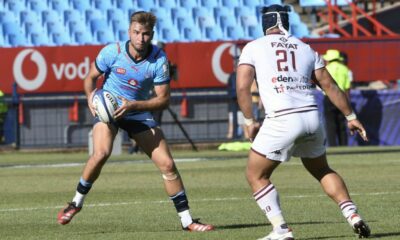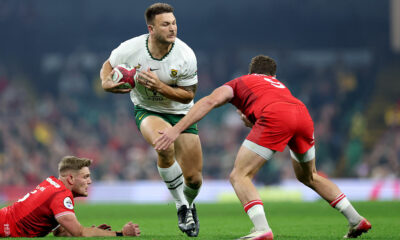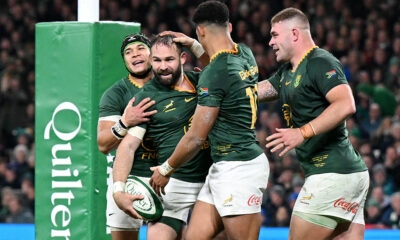#SouthAfrica2023
Saluting the Springboks World Cup-winning class of 2007
Remember Paris, 2007. It was the Rugby World Cup year of the Springboks. John Smit’s squad of players were based in Paris for most of the tournament and the French people adopted the Springboks as their alternate when France bombed. Not only were the Boks the most popular side at the tournament but they were also the best.
My Monday Business Day Newspaper column revisits the remarkable Springboks tournament win.
We’re a nation of rugby supporters who thirst for success but equally we find it so hard to celebrate our successes.
October 20 is the 10th anniversary of the Springboks’ 2007 World Cup victory.
Only the Springboks and All Blacks have won rugby’s grand prize on debut (the All Blacks in 1987 and the Springboks in 1995) and only the Springboks and All Blacks have won the World Cup home and away.
October 20 is a reminder of the glory of the Springboks. Take a moment to reflect on that wonderful night in Paris because yesterday’s winners will inspire the next generation of Springboks winners.
For today’s Springboks there has to be an understanding of the magnitude of the occasion and of what it took to win the World Cup. There has to be a celebration.
The storytelling has to be more consistent and it has to boast about two very different but equally dramatic World Cup wins in South Africa in 1995 and in France in 2007.
I was fortunate to report on every Springbok World Cup game in 1995 and 2007. It was a privilege to write about these champions and it remains a privilege to be in a position to continue to tell their story in the month of October when World Rugby’s Executive will confirm the independent recommendation of which of South Africa, Ireland or France will host the 2023 World Cup.
South Africa 2023 would be a rugby carnival unlike any in the game’s professional history. It would be total immersion and this country’s sporting and rugby support base would embrace every one of the 20 competing countries.
There should be total backing among the South African rugby public for bringing the World Cup back to South Africa in 2023. Equally there should be an annual reliving of those 1995 and 2007 World Cup victories.
More should be done to bring the two squads from 1995 and 2007 together in celebration and it is crucial to future success that the performances of those who inspired South Africa’s two golden moments are shown again and again.
There’s a magic about the Springboks when it comes to international rugby – and there always has been. The low of 2016 is not an aberration in the history of the Springboks. There have been years of equal distress and disillusionment. But the Springboks historically over the last 100 years have always recovered to be a leader in the game.
Those World Cup warriors of 1995, led by Francois Pienaar, and the class of 2007, with John Smit as the helm, can never be thanked enough. If you talk rugby legends and South African rugby legends, then surely there also has to be an exclusive Springbok World Cup Legends comprising of those players who have won World Cup gold.
The Springboks in 1995 and 2007 produced some of the great World Cup moments, as a team and in individual performances. The 1995 opening game win at Newlands against defending champions Australia and the 36-0 win against England in Paris are two of my favourite matches.
The courage of the 1995 squad was similar to that of 2007.
The defining 1995 Springbok match was the semi-final against France in Durban. The 2007 Springboks’ defining match was the quarterfinal win against Fiji in Marseilles. Both those matches could easily have been lost and both were won through an absolute refusal to be beaten.
The Boks of 1995 talk of that last scrum against France, in which lock Kobus Wiese famously told Springbok prop Balie Swart that he could go sideways or forward but he certainly wasn’t going to be going backwards.
In 2007 it was wing JP Pietersen’s covering tackle that killed the Fiji momentum as the game threatened to be taken away from the Boks.
In 1995 Springboks fullback Andre Joubert played through the quarterfinal, semi-final and final with a broken hand. In 2007 Springbok fullback Percy Montgomery played the last 45 minutes of the final with torn knee ligaments and kicked two of his four penalty successful penalty goals with one functional leg.
Os du Randt, as a kid in 1995 and as the grand old man of the 2007 victory, was colossal in defining Springbok rugby excellence.
We should never tire of telling the World Cup story of Os, Joubert, Montgomery, the tackles of Joost van der Westhuizen and Japie Mulder on Jonah Lomu, Chester Williams’s four tries against Samoa in 1995 and Bryan Habana’s four against Samoa in 2007.
And of course the 1995 World Cup Final match winning drop goal from Joel Stransky.
The players of 1995 and 2007 represent the past but it’s this inspirational past that will influence an equally inspirational Springbok rugby future.
#SouthAfrica2023
World Rugby celebrates the scam that was the 2023 bid
World Rugby’s 2023 Rugby World Cup bidding process was a scam but the men behind the scam celebrated in London with absolute disregard for the damage done to the sport.
South Africa produced a compelling and brilliant bid to host the Rugby World Cup in 2023.
It proved irresistible for World Rugby’s appointed Technical Review Committee. But it made little impression on the General Council members, who disregarded the recommendation to vote overwhelmingly in favour of France, who as recently as 2007 hosted the World Cup.
France, who were a distant second to South Africa in the independent review released a fortnight ago, won the first round of voting by 18 to South Africa’s 13 and Ireland’s 8 and the second and final round 24-15 against South Africa.
The vote was secret, which against underscored the lack of transparency within World Rugby.
South Africa’s bid promised World Rugby:
*A record 2.9 million ticket sales
*A record 85 000 World Cup final attendance at the National Stadium
*The most profitable World Cup in the tournament’s history
World Rugby, for the first time ever, effected a professional and objective bidding process, underpinned by the Weighted Criteria Scorecard, as well as the evaluation commissions report and independent service provider reports.
World Rugby appointed a Technical Review committee to audit and analyse all three bids and this Review Committee a fortnight ago recommended South Africa as the strongest of the bid candidates.
South Africa, according to the Technical Review Committee, scored first in three of the five main categories, as set out by World Rugby in the Bid criteria. France scored second in all three categories in which South Africa ranked first.
South Africa also scored first or tied first in 22 of the 27 sub categories. France scored first or tied first in 14 of the sub categories.
South Africa also scored first in seven of the 10 sub categories in which there was a clear winner. France scored first in two of these categories.
South Africa’s bid succeeded because it scored highest in:
*Venues and host cites (30%)
*Tournament infrastructure (20%)
*Tournament, organisation and schedule (5%)
South Africa, whose financial projections boasted of 2023 being the sport’s most profitable World Cup, scored second to France in the category of Finance, Commercial and Commitments, which made up 35% of the Technical Review Report.
The bid described South Africa as a world in one country, from beaches to vineyards, from mountain ranges to the bushveld. It said South Africa was a country alive with possibilities for visitors.
Most importantly, the bid emphasized that voting for South Africa made rugby and commercial sense.
South Africa is just one of two countries to successfully host the Cricket, Rugby and Soccer World Cups and has a proven track record of major incident-free major international events
South Africa’s bid also made a 10 commitment declaration to Rugby World Cup Limited, developed and designed to make South Africa accountable to translating the words of the bid document into tournament delivery.
The 10 commitments included:
*Honouring the custodianship of the tournament in its 10th anniversary and the game’s 200-year history
*Ensuring peak performance from the world’s best because of the bid’s player-centric focus
*That World Rugby would make money because the tournament would be low-risk and high return in an ideal commercial environment.
*That four of South Africa’s eight rugby and true multi-purpose all-seater world-class match venues meet and exceed the requirements to host the final
World Rugby, at the outset of the bid process, stated that critical fundamentals included:
*Clear government support
*A tournament fee guarantee payable by government
*Stadiums appropriate for a world-class rugby event available exclusively for the duration of the tournament
*A robust and credible tournament budget.
A review of the independent report released to the public showed that France provided none of these four elements.
Apart from the concerns around the 2024 Summer Olympics impact on the tournament, the French government is not playing the tournament fee.
The report also stated concerns that five of the nine French venue guarantees were still subject to city approval, and eight are not available exclusively and will host football during the Rugby World Cup, resulting in numerous challenges and costs including undersized pitches at all match venues.
Security was also a concern because of recent terrorists attacks in Paris.
In the end it counted for nothing as World Rugby’s Technical View recommendation got ignored in the secret vote.
Rugby has got a lot to answer for …
#SouthAfrica2023
France to host 2023 as Council votes against South Africa
World Rugby’s General Council voted against the recommendation of South Africa as 2023 hosts and handed France the World Cup.
France hosted the World Cup in 2007 and the decision means that the World Cup will again be in the Northern Hemisphere.
South Africa a fortnight ago was deemed the ‘clear winner’ with France ranking second and Ireland third.
But the French vowed to use any means to sway the Council Members and with a secret ballot at play, they did just that in convincing the Council a World Cup in France was the best thing for World Rugby.
France won the first round of voting by 18 to South Africa’s 13 to Ireland’s eight and then beat South Africa 24-15 in the final round.
SA Rugby Union President Mark Alexander said: ‘We produced a compelling bid document that earned the unanimous recommendation of the Rugby World Cup Ltd board. That recommendation was questioned last week by rivals, but endorsed a second time by World Rugby last week.
“However, the view of the experts and World Rugby’s leadership was overturned by World Rugby Council members, who may have had other factors to take into account.
“We cannot hide our desolation but, for the sake of rugby we wish the 2023 tournament hosts every success.”
Julie Roux, CEO of SA Rugby, ruled out any suggestions that his organisation might challenge the vote.
“We have said throughout that we would honour both the letter and the spirit of the process and we now consider the 2023 bidding process closed.
“However, in the feedback sessions I am sure we will be recommending to the World Rugby Council that the verdict of the evaluation committee become binding.
“World Rugby ran an exhaustive and transparent process for 15 months to identify the best host nation, only for the process to go entirely opaque for the past two weeks.”
Alexander said that after a fourth successive disappointment in the Rugby World Cup bidding process it was difficult to know where South Africa would go from here.
“It will be for the next generation of SA Rugby leaders to decide whether to compete for the 2027 tournament or beyond,” he said.
“I am sure our country will fulfil the dream of hosting the tournament once again someday; our hearts bleed that it will not be in 2023.”
#SouthAfrica2023
Currie Cup best XV: All based on stats
Here’s a breakdown of the Currie Cup’s top performers, based on pure statistics, alloutrugby. Let’s see how they stack up against your personal favourites.
1. Thomas Du Toit (Sharks)
Loosehead Thomas du Toit emerged as one of the most exciting players in the tournament and a gem that South African can polish in the years to come. He has proven himself to be a versatile prop forward who is explosive in general play with 66 ball carries in the tournament. He offloads the ball well and has had effected an impressive eight turnovers. He can scrum, even though it didn’t always look like it against Wilco Louw in the final.
2. Franco Marais (Sharks)
Franco Marais was a consistent performer for the Sharks, helping them to a home final. His disciplined style saw him concede only eight penalties throughout the tournament.
3. Wilco Louw (Western Province)
This season he has been destructive in giving WP the edge at scrum time. He has been immovable and that quality has formed the foundation of WP’s win in the final. Louw made 16 dominant tackles in the tournament and went about his work efficiently and without fuss.
4. Chris van Zyl (Western Province)
Captain of the Currie Cup Champions in 2017, ‘Pickle’ was an ever-present for Province, playing 1006 minutes in a victorious campaign. Van Zyl’s work rate saw him make 154 tackles (only teammate Nizaam Carr made more). Van Zyl won 54 lineouts (more than any other player) and he stole the second most lineouts (8)..
5. JD Schickerling (Western Province)
Schickerling played the most minutes in the tournament with 1043, and made the most dominant tackles (43). He completed 94% of his tackles and made 114 ball carries (the sixth most).
6. Keegan Daniel (Sharks)
Daniel played 987 minutes, scored three tries and made 19 offloads. He also made 5 turnovers, won 26 lineouts and won two on opposition throw.
7. Dan du Preez (Sharks)
One of three brothers, Du Preez conceded just one penalty at ruck time, made 14 offloads and also won three lineout wins.
8. Nizaam Carr (Western Province)
Carr made 13 tackle breaks, 23 offloads and 157 ball carries (this stat was the highest of any player in the tournament). He also scored five tries. Carr’s 194 tackles were a tournament high.
9. Dewald Duvenhage (Western Province)
Duvenhage completed 65 out of 66 passes in the final and made the second most passes in the tournament (450), despite playing only 489 minutes.
10. Curwin Bosch (Sharks)
Bosch ended with five successful drop goals, and the second most points (93).
11. Seabelo Senatla (Western Province)
Senatla scored seven tries and forced seven turnovers.
12. Huw Jones (Western Province)
Jones scored a brace in the final and seven tries in the tournament. He made 15 offloads and 18 dominant tackles. He was strong in the final, making nine tackles.
13. Lukhanyo Am (Sharks)
Sharks outside centre Am, has been dominant in the Sharks Currie Cup campaign. He made nine line breaks and eight turnovers and impressed with the all-round balance in his game.
14. Dillyn Leyds (Western Province)
Leyds’s versatility was showcased in WP’s campaign and he played in three different positions. He also scored a try in the final.
15. Warrick Gelant (Bulls)
Gelant’s 10 tries were the most in the tournament, as was his 1578 metres with ball in hand. He also had the most linebreaks (22) and the second most offloads (21).
Honourable mentions
Damian Willemse
Tyler Paul
Bongi Mbonambi
Jaco Coetzee
Robert du Preez
#SouthAfrica2023
South Africa’s the recommended World Rugby choice for #RWC2023
World Rugby’s Technical Review Committee scored South Africa the highest of the three bidding countries to host the 2023 Rugby World Cup.
World Rugby confirmed the recommendation, with South Africa outscoring France and Ireland a distant third.
South Africa hosted the World Cup in 1995.
‘The comprehensive and independently scrutinised evaluation reaffirmed that we have three exceptional bids but it also identified South Africa as a clear leader based on performance against the key criteria, which is supported by the Board in the recommendation.
World Rugby’s detailed evaluation report
World Rugby’s statement reads:
The evaluation of the detailed bid submissions has been led by a team of World Rugby and external area experts. This was supported throughout by stringent independent evaluation and analysis from The Sports Consultancy to ensure evidence-based objectivity and consistent application against a set of weighted scoring criteria based on the following World Rugby objectives, which were agreed by the Board, noted by Council and communicated to the host candidates:
- Venues and infrastructure commensurate with a top-tier major event
- Comprehensive and enforceable public and private sector guarantees
- A commercially successful event with a fully funded, robust financial model
- Operational excellence through an integrated and experienced delivery team
- A vision that engages and inspires domestic and international audiences and contributes to the growth of rugby at all levels
- An enabling environment of political and financial stability that respects the diversity of the Rugby World Cup’s global stakeholders
- An environment and climate suited to top-level sport in a geography that allows maximum fan mobility
#SouthAfrica2023
#SA2023 RWC Video – Where rugby is No 1
#SA2023 is in full swing, with South Africa the frontrunners to win the right to host the 2023 event.
Three independent companies have assessed the technical and commercial strength of South Africa, Ireland and France’s Rugby World Cup bid and in this week will make a recommendation to World Rugby.
The recommendation will be made public on October 31, but that doesn’t guarantee the right to host. World Rugby’s General Council will vote on November 20.
South Africa’s bid leadership has been vocal that it is Africa’s time again, with rugby so much more than a game in South Africa, and it was such a uniting factor in 1995.
Keo.co.za coverage on the #SouthAfrica2023 RWC Bid
Watch the video and tell us you aren’t a little bit excited. Imagine winning the sport’s greatest prize on home soil again.
#loverugby
#SouthAfrica2023
South Africa’s RWC 2023 bid unpacked
South Africa’s 2023 Rugby World Cup bid has been condensed into a gloss online magazine offering for your perusal.
The 80 page reader-friendly summary of the 800-page bid book breaks down the RWC2023 Bid Scorecard and details exactly why South Africa believes it is best positioned to host the Rugby World Cup.
France and Ireland are also bidding to host 2023.
South Africa’s bid leadership states that the bid speaks emphatically to World Rugby’s scorecard and adds that South Africa’s bid is technically excellent and commercially compelling. The leaderships says the tournament will make a record profit and that South Africa will produce an exceptional tournament in unrivalled facilities … all against a unique background.
The scorecard is make up of the following:
Finance, commercial and commitments: 35%
Venues and host cities: 30%
Tournament infrastructure: 20%
Vision and concept: 10%
Tournament, organisation and schedule: 5 %
SouthAfrica2023 RWC Bid Book Magazine
Three independent companies have over the past three months assessed all three respective bid books, based on the World Rugby scorecard. A recommendation will be made to World Rugby and this will be made public on October 31.
The recommendation does not equal a guarantee and World Rugby’s General Council vote on November 15 will determine the winning country.
#SouthAfrica2023
Southern Palace Group add sunshine to brighter SA rugby future
The Southern Palace Group of Companies this year invested in the Springboks for the next three years and recently also added their considerable corporate weight to the South African 2023 Rugby World Cup bid.
But who exactly are the Southern Palace Group?
There is no doubting the Springbok player’s intention in Bloemfontein, post the 27-all draw with the Wallabies, when he made the effort to approach members of the Southern Palace Group of Companies and thank them for their investment in the Springboks and for their belief in the future of South African rugby.
The player then apologised for not yet having made it to rugby’s newest sponsor’s resort, be it the hotel or casino.
It was a very sweet and important moment because here was a player going out of his way to recognise the presence of those corporates who contribute to the financial wellbeing of the sport in the country.
It is a credit to the culture within the Springboks that there is respect for those who invest in the sport but it also illustrated how little (within rugby’s wider circles) is known about the kind of heavyweight now in the sport’s corner.
Here’s the thing: The Southern Palace Group of Companies is not a hotel or casino resort but an all-South African black owned business that is transforming businesses in South Africa and also wants to contribute to the transformed business of rugby in South Africa.
SA Rugby’s CE Jurie Roux earlier this year applauded SPG’s involvement in South African rugby. He said it epitomised the confidence in the Springbok brand and also reinforced the importance of having a local, proudly South African company aligned to the Springboks and South African rugby.’
SPG’s Group Chief Executive Lucas Tseki echoed Roux’s sentiments in describing the partnership as one that dovetails with the sport’s transformation and also one that he believed would give SA Rugby a transformative edge off the field.
Tseki described SPG’s relationship with rugby as another example of the company’s vision of investing in heritage South African brands.
SPG, in the past year, acquired controlling interest in engineering and construction group Murray & Roberts (M&R), with the newly black-owned construction company now called Concor.
Tseki reaffirmed the aim of Concor was to build on M&R’s 115-year South African heritage in becoming a leading Tier 1 infrastructure player in South Africa and in sub-Saharan Africa.
Tseki said the company’s vision included unlocking the infrastructure backlog, which extended to healthcare, education and transport, as well as the water and sanitation sectors.
‘As Africa has to modernise, someone has to build the infrastructure. There is no reason why (Concor) cannot be a leader in these spaces.’
SPG’s initial investment in South African rugby may be dwarfed when compared to their other investments, but the company’s commitment to adding to the transformation of the sport, through growth and prosperity, certainly is no smaller.
SPG, through a start-up three-year sponsorship, has recognised the iconic 100-plus years heritage of the Springboks and also entrusted the sport’s role in modern South African society.
And everything in 2017 is pointing towards this just being the start of SPG’s interest in rugby.
For purposes of those who may not know, including the well-intentioned Springbok player, the Southern Palace Group of Companies has a huge presence in a diversified business portfolio that includes infrastructure and construction, steel, manufacturing and recycling, automotive trading and manufacturing and technology and properties, with recent investments being in Concor (formally Murray & Roberts Construction) and Safari Investments.
Springbok rugby has now been added to that business portfolio and Tseki said the hosting of the Rugby World Cup in South Africa in 2023 would be a major injection on every social, commercial and sporting level.
The transformation of all sectors within South Africa is critical to SPG, but the company’s vision was not limited to ownership transformation but a holistic transformation that would not compromise on operational excellence and delivery.
Roux, in welcoming SPG to the Springboks, acknowledged the significance of the alignment when it comes to a healthier commercial future of rugby in South Africa.
Tseki concurred: ‘Our slogan of driving tomorrow bodes well with the South African rugby team, who are driving towards building a winning and world class rugby team on the field.’
#SouthAfrica2023
SA’s 2023 RWC bid finds international favour
South Africa’s 2023 Rugby World Cup bid was given an international vote of confidence through the reporting of two of the game’s most influential rugby writers.
Stephen Jones of the London Sunday Times described South Africa’s bid as ‘magnificent’ and the New Zealand Herald’s Gregor Paul wrote that South Africa, arguably, had the greatest ability of the three bidders to generate that wow factor experience.
Both writers acknowledged the strength of France and Ireland as potential hosts, but Jones was quick to caution his audience that it was not a two-horse northern hemisphere race.
‘Last week, several accounts of the media presentation of bids mentioned only Ireland and France, as if South Africa have no chance whatsoever. Another account said that Ireland were “hot favourites”. Neither assertion is true,’ wrote Jones.
‘The truth is that the South African bid is magnificent. They have a sound track record in staging big events and their stadiums are all sensational. The country has good communications and for those who travel with open eyes and hearts, it is a magnificent place.
‘And, tellingly, their bid document features the words of the late President Mandela on page three. Memories of the glorious weeks in South Africa in 1995 can still pull the heart strings 22 years on.’
Jones and Paul highlighted political negativity, real or perceived, as the only obstacle in South Africa hosting the Rugby World Cup for a second time.
Jones wrote that if the South Africans could convince World Rugby’s authorities that their money is safe and that none would be salted away, then South Africa could win the right to again bring the tournament to Africa.
South African Deputy President Cyril Ramaphosa’s presence in London for the bid presentations on September 25 would have done much to allay fears, and all reports were flattering and complimentary of the Deputy President’s impact when addressing World Rugby’s General Council.
South African Chief Executive Jurie Roux superbly led the technical summary of South Africa’s bid, Springbok World Cup-winning captains Francois Pienaar (1995) and John Smit (2007) added presence, charm and integrity to the South African bid team and South African rugby could not have asked for a more favourable government impression than that which was created by Ramaphosa.
Paul, in assessing the three bidding countries, applauded Ireland and France as worthy of hosting the World Cup, but he focused on the option of South Africa as the one he would want to see winning World Rugby’s General Council vote on November 15.
Paul wrote: ‘The World Cup hasn’t been in South Africa since 1995 and to many, it remains one of the best – certainly one of the more emotionally charged and inspiring. To leave South Africa out in the cold for at least another four years would be a shocking way to treat one of the aristocrats of the game.’
Paul argued that deciding a World Cup host shouldn’t be a cold, clinical exercise made on the back of a handful of grey men and women pouring over spreadsheets and giving their view on the numbers.
‘Forget the economics, the politics, the sponsors, the time zones, the broadcast implications and whatever else the money men endless fret about,’ he wrote. ‘It should be an emotional process, driven by the heart and not the head. All three bids have the potential to deliver the money World Rugby is looking for.
‘A World Cup is an experience more than an event. (South Africa 2023) would be an odyssey through a traditional rugby power – as close as anyone could ever get to re-enacting an old-school tour.
‘It would be a tournament dripping in nostalgia and yet everywhere there would be constant reminders of the changing face of South Africa.’
Paul recognized Ireland’s improvement on the field in the last five years, with the apex being 2016’s history-making first ever win against the All Blacks in Chicago, but he said the Boks remained one of the game’s icons.
‘Ireland can legitimately argue they are the fast rising, new force of world rugby and they are due some kind of acknowledgement,’ said Paul. ‘But South Africa have won two World Cups and the Boks have been a rugby heavyweight since year dot. South Africa’s need and right to be acknowledged is greater than Ireland’s.
‘And maybe above all else, it is simply time South Africa was shown a bit of love: rewarded for its long and rich rugby history and contribution.’
World Rugby’s General Council will vote for the host country on November 15.
#SouthAfrica2023
SA’s RWC bid to bring back Bill
South Africa’s 2023 Rugby World Cup bid meets and exceeds every one of World Rugby’s primary seven bid objectives.
The South African Rugby Union president Mark Alexander and CE Jurie Roux, along with South Africa’s Deputy President Cyril Ramaphosa, will lead South Africa’s bid presentation to World Rugby’s General Council in London on Monday, September 25.
France, Ireland and South Africa’s bid leadership teams get one ‘in person’ opportunity to impress those whose vote will determine who gets to host the 2023 World Cup.
There are 37 votes among the World Rugby Council members and a majority 19 is needed to win the vote.
The World Council members will vote on November 15.
South Africa hosted the event in 1995 and France was the primary host in a shared hosting agreement in 2007. Ireland has never hosted the World Cup.
World Rugby’s seven bid objectives, which are at the heart of all assessments of the respective contenders, include:
- Venues and infrastructure commensurate with a top-tier major event
- Comprehensive and enforceable public and private sector guarantees
- A commercially successful event with a fully funded, robust financial model
- Operational excellence through an integrated and experienced delivery team
- A vision that engages and inspires domestic and international audiences and contributes to the growth of rugby at all levels
- An enabling environment of political and financial stability that respects the diversity of Rugby World Cup’s global stakeholders
- An environment and climate suited to top-level sport in a geography that allows maximum fan mobility
South Africa’s bid leadership is adamant that its bid speaks favourably to every one of the objectives and also reinforces and advances World Rugby’s vision and mission of creating a global sport for all in a world class tournament that remains true to the sport’s core values of integrity, respect, solidarity, passion and discipline.
South Africa’s bid underlines World Rugby’s mission that rugby be a truly global mass participation sport and that the event in South Africa in 2023 would support the world governing body’s primary goals to protect, grow and inspire the game.
South Africa’s bid answers every necessary standard set in terms of venues and infrastructure, as it does the financial guarantees and the operational excellence that would make South Africa 2023 commercially successful and the most profitable in the history of the World Cup.
South Africa’s leadership has also trumpeted the country’s passion for the game, as well as the superb playing conditions, the fantastic stadia and a spring climate that that makes for a fantastic tourism experience.
‘Our nation has done big events many times before. We don’t need to build new stadiums or upgrade old ones. We don’t need to worry about guarantees and we don’t need to pass new legislation. Every last detail of the required specifications is already in place,’ will be (Mark) Alexander’s message to World Rugby’s General Council.
South Africa will present a bid that focuses on high quality at low cost. It will be a bid that speaks to World Rugby’s financial reality as much as it does the raw emotion of rugby in a traditional stronghold.
The tournament fee guarantee is 120million GBP and while France has gone public to state it will pay 150million GBP to ensure greater net returns for World Rugby, the South African Government, in the official bid book delivered to World Rugby at the end of May, committed a financial guarantee of 160million GBP. It is the highest guarantee among the three bidding countries.
South Africa’s bid promotes player welfare and a unprecedented player comforts, which can be made possible because of a tournament budget worth 360 million GBP.
South Africa also has the required major event security expertise and a proven track record of hosting incident free major international events, the biggest of them being the 2010 FIFA World Cup.
South Africa’s projected 2.9 million ticket sales will be 400 000 more than the RWC2015 in England, and this will make it the best attended Rugby World Cup.
Rugby commands a loyal following in South Africa and 60 percent of the South Africa’s population older than 16 shows an interest in rugby.
South Africa’s bid also focuses on the introduction of one million school children to Rugby via World Rugby’s ‘Get into Rugby’ initiative.
The Springboks have won the William Webb Ellis trophy, also known as ‘Bill’ in 1995 and 2007. South Africa and New Zealand are the only two countries to have won the trophy home and away.
#SouthAfrica2023
SA Rugby’s black economic boost
The investment in the Springboks of black owned business heavyweight, the Southern Palace Group of Companies, is huge for the future of the game in South Africa.
South African Deputy President Cyril Ramaphosa’s presence in London on Monday is also confirmation of the intent in South Africa’s 2023 Rugby World Cup bid.
It could also be the moment that seals the deal for South Africa to win the confidence of World Rugby in relation to doubts over the political stability within South Africa.
South African Rugby Union’s leadership duo of Mark Alexander and Jurie Roux will present on what makes South Africa’s bid technically and commercially compelling, but it’s the government presence in London that will significantly improve South Africa’s bid prospects.
World Rugby, in its bid stipulations, places a premium on government support and government financial guarantees, to ensure there is never a financial compromise to the sport’s global governing body.
The government, as the leader partner in the bid process, has signed off on all World Rugby’s requirements and even guaranteed 40million GBP more than the tournament guarantee of 120 million GBP.
The government stance has been influenced by the huge strides made in the last 18 months when it comes to transformation in South African rugby and rugby bosses would also have had their case (within government) boosted by the Southern Palace Group’s historic sponsorship of the Springboks.
The Southern Palace Group of Companies is an independent all South African, black owned and managed company, who a few months ago committed to a first up and initial three year investment as an associate sponsor of the Springboks. They wouldn’t have aligned with a sport they did not believe spoke to the broader South Africa, to the transformation of South African sport or to their own value system.
The company’s motto is about driving tomorrow and of South Africa being a country and Africa a continent of possibilities. For them to associate with the Springboks, and by extension South African Rugby, makes it the biggest transformation victory since unification.
Transformation in rugby has always been a black player numbers game, especially in media story telling.
But the bigger picture is in the commercial investment of rugby, and it can’t be overstated just what a boost it is to the future of South African rugby to finally have South African black corporate interest and investment in the Springboks.
It’s as significant to the game’s health, as the government’s 160million GBP guarantee is to the 2023 RWC bid.
#SouthAfrica2023
South Africa is rugby’s No1 destination
South Africa’s international appeal as a sought after tourist destination will prove as decisive as South Africa’s standing as a recognised rugby powerhouse in influencing the vote to determine the hosts of the 2023 Rugby World Cup.
The bidding process, for the first time in the tournament’s history, is underpinned by World Rugby’s Weighted Criteria Scorecard.
Host cities, venues and tournament infra-structure make up 50 percent of this scorecard – and it’s a scorecard that speaks favourably to South Africa because of the stadia legacy of FIFA 2010 and the internationally acknowledged and celebrated reputation of South Africa’s premier cities.
South Africa’s Rugby World Cup bid platform is strengthened because of eight super stadia in seven cities, and while the rugby leadership rightfully can boast about the quality of the already operational and functional stadia, it’s the attraction of the cities that are home to these stadia that could determine which way the Council members vote.
The leadership of all three bidding teams (South Africa, France and Ireland) will get an opportunity to present to World Rugby’s Council in London on September 25.
The Council will then vote to determine the winning bid on November 15, but in the interim (in October) World Rugby’s Executive will also receive the evaluation commissions report and independent service provider reports, as per the Weighted Criteria Scorecard.
It would generally be accepted that the Council vote would be consistent with the independent recommendation but it’s no guarantee that the Council members share the view of those independents when it comes to who gets ranked one, two and three.
The independents, who are assessing each bid, may conclude that very little separates the three in an overall percentage, which then highlights the importance of how the selling job gets done (to the Council members) by each country’s respective bidding teams.
What makes South Africa’s sell to the World Council that much easier, outside of an extremely compelling commercial and technical bid, is the city and provincial make-up of the country.
The Western Cape is renowned as one of the world’s top tourist destinations, while South Africa’s international appeal includes wildlife and spectacular beaches and coastlines.
There’s more to hosting a World Cup than the match day occasion and it’s here where South Africa has an advantage in the diversity of the offering, from Table Mountain to the Kruger National Park.
‘We do believe we have answered all the rugby related questions,’ says South African Rugby Union President Mark Alexander. ‘Our bid is very strong, but so is the lure of visiting South Africa for the tourist experience. It’s very unique.’
South Africa’s host cities’ decision makers, like the government (provincially and nationally) had to agree that there was value in hosting a Rugby World Cup. There had to be benefit beyond rugby’s needs as a sport.
It had to make economic sense; and it does.
Port Elizabeth, as just one example, detailed the financial gains of hosting a Springbok Test match.
Nelson Mandela Bay Business Chamber acting CEO Prince Matonsi estimated that there would be in excess of R155 million contribution to the region’s GDP, based on having the Springboks in Port Elizabeth for one week during this year’s Rugby Championship.
Imagine the commercial return when several international teams are based in the region for a month during a World Cup?
Matonsi is among the converted as to the benefits of international sporting events in his region.
‘It benefits the different businesses that are involved, filters through the rest of the economy and also gives an injection into maintenance of the (Nelson Mandela Bay) stadium, which is crucial to Port Elizabeth being a world-class sporting destination.’
South African Rugby Union Commercial Manager Tsholo Khubeka says the response from the proposed host city’s respective leaderships has made South Africa’s bid even more compelling.
‘We’ve said from the outset that this is a bid about South Africa and South Africans, of which rugby is the vehicle. It has to have the support of government and it has to have the buy in from those host city representatives. We’re fortunate and blessed to be able to have the (city) locations we have in terms of our bid.
‘Our stadia offering is without comparison and so too is the tourist aspect of what you can do when visiting each of the host cities.’
South Africa’s bid also focuses on the World Bank’s Purchasing Price Parity data, which shows that visitors to the 2023 World Cup can experience three weeks in South Africa for what it would cost for one week in either France or Ireland.
South Africa is renowned for its rugby, but the success of hosting the Rugby World Cup, like the bid itself, is about what supports the rugby offering.
And when it comes to tourism in South Africa, it’s pretty much got everything and a low cost with no compromise to quality.
#SouthAfrica2023
How RWC 95 inspired Habana
The power and influence of hosting the Rugby World Cup in South Africa in 2023 could inspire the game’s next try-scoring record breaker and trendsetter to again be South African.
Bryan Habana was just 13 years-old in 1995 when South Africa hosted Rugby’s World Cup and the late Nelson Mandela forever transformed the game’s landscape in how he embraced the tournament and the Springboks in his capacity as the country’s president.
‘I saw Nelson Mandela walk out in that Springboks jersey which could never have happened in apartheid time. But there I sat as a 13-year-old youngster who had never picked up a rugby ball in terms of a team context, but it inspired me to hopefully one day inspire that next generation and to bring a nation together,’ recalled Habana.
Fast forward from 1995 to 2007 and it was the late Madiba embracing Habana, South Africa’s World Cup-winning star and World Rugby Player of the Tournament and Player of the Year.
Habana, like all the 2007 World Cup-winning Springboks, dedicated the trophy to the man they believed owned the game with his incredible and powerful introduction in 1995.
Players, individually and when talking on behalf of the squad, have consistently spoken of the inspiration of Nelson Mandela and the desire within the squad to win the World Cup for Madiba.
Morne du Plessis, former Springbok captain and the 1995 Springbok manager, impressed on the class of 2007 that it was time for a new story in Springbok rugby. He said the class of 95 needed another group to go one step further and win the World Cup away from home.
Jake White, coach of the 2007 World Cup Boks, spoke of the gratitude the players felt to Mandela for what he had come to represent to the Springboks.
‘The great man visited us when he was in Paris. He wasn’t at his best health but he was insistent on seeing his boys at the World Cup,’ says White.
‘He told them they were good enough to win the competition and that he was looking forward to them visiting him back in South Africa with the trophy. It was one of the great days in all of our lives to make that visit to him with the trophy.’
Habana, in several interviews, detailed the power of a Rugby World Cup in one’s own country. He singled out the impact of Jonah Lomu in 1995. Habana was enthralled, as was probably every young kid who got to see Lomu at his destructive best.’
‘He was just something else,’ says Habana, reinforcing the experience (as a youngster) of witnessing the best players in one’s own country.
Habana, like the core of the 2007 World Cup winning squad, was given a tangible in aspiration and inspiration because of the 1995 tournament in South Africa.
The Springboks, post 1995, were among an elite few to win the tournament and only the Springboks and All Blacks have won the tournament at home and away.
Habana’s record-equaling 15 World Cup tries were integral to the 2007 gold medal and the 2015 bronze medal, but had there been no World Cup in South Africa in 1995 it may be that the world would never have got to experience Habana’s try-scoring heroics.
Habana’s life career choice may have been anything but rugby.
South Africa 1995 gave a young kid the appetite to want to play rugby, be a Springbok and win the World Cup – a kid who up until then had never given it a thought to play rugby for his country.
It’s why Habana knows the significance of having the World Cup in South Africa in 2023 because there may just be another unsuspecting 13 year-old seduced by the greatest game on earth, who a decade later is among the greatest try scorers to ever play the game.
#SouthAfrica2023
Rating South Africa’s best RWC moments
South Africa’s leadership presents its Rugby World Cup 2023 Bid to World Rugby’s Council later this month. I’ve picked my five best Springbok World Cup moments.
For me the Springboks’ 1995 World Cup final win against the All Blacks tops the list as South African rugby’s biggest World Cup moment.
There have been some amazing World Cup moments for the Springboks and remarkable individual achievements since the Springboks 1995 World Cup debut.
Chester Williams’s four tries against Samoa in 1995 and Bryan Habana’s four tries against Samoa in 2007 showcased brilliant finishing. Jannie de Beer’s five drop goals against England in the 1999 World Cup quarter-final in Paris was arguably the most remarkable individual achievement in the history of the tournament and the goalkicking accuracy of Joel Stransky in the 1995 final and Percy Montgomery in the 2007 World Cup final ensured gold for the Springboks.
South Africa, despite playing two less tournaments than three-time World Champions the All Blacks, rank as one of the great achievers in World Cups.
The Springboks have won two gold and two bronze medals in six World Cup tournament appearances and twice been beaten quarter-finalists.
The Springboks 2007 World Cup victory was sweet and deserved because they were comfortably the best team in France. I’ve heard the arguments that they had an easy ride to the title because they played Fiji, Argentina and England in the play-offs, but if the All Blacks and Australia and France had been that good they would have made it to the last four.
The Springboks didn’t pick who they played in the semi-final and final and there is nothing hollow about the Springboks 2007 World Cup final win against England.
I rank the 1995 win above the 2007 win because of the quality of the opposition in the final. The Springboks in 1995 beat an All Blacks team that rates as one of the finest in the professional era.
I was fortunate to be at Ellis Park reporting on the final. Words could never do justice to the magnitude of the occasion and the victory. Books were written about it and Hollywood even made a movie about it. But neither the book nor the movie was quite as good as being there on the day.
Why do I want South Africa to host the 2023 World Cup? I want to see, among other things, South Africa playing the All Blacks in the final at the National Stadium – and winning!
And I want to again experience absolute rugby mania in this country for six weeks. I know we’ll host an incredible Rugby World Cup but it’s the potential of those matches in 2023 and individual performances that will further entrench South Africa in rugby folklore.
The Springboks will always be a contender to win the World Cup, which makes it even that much more appealing to know your team has the capacity to be the champions.
So, for purposes of record and for discussion and debate, here’s my top five Springbok World Cup matches:
1. 1995 World Cup final against the All Blacks
2. 2007 World Cup Group win against England. The Springboks destroyed them 36-0 in Paris.
3. Again, Paris and this time 1999. Jannie de Beer kicks five drop goals and against all odds the Springboks hammer England in the quarter-final.
4. The 1995 World Cup opening game win at Newlands against the defending championship Australia.
5. The 2007 World Cup final win against England in Paris.
*And for those who feel the Guinness tastes better in Ireland, here’s something to consider.
The latest price parity shows the cost of a beer to be:
Paris – 7 dollars 50 cents
Dublin – 6 dollars 50 cents
Cape Town – 2 dollars 10 cents
Johannesburg – 1 dollar 70 cents
#SouthAfrica2023
Monty adds muscle to World Cup bid
Springbok legend Percy Montgomery says South Africa’s hosting the 2023 Rugby World Cup would be the equal of what it meant to New Zealand in 2011.
Montgomery, the first Springbok Test centurion, is a proud ambassador to everything Springbok rugby, especially the prospect of South Africa hosting the 2023 World Cup.
‘It would be so big for our country and for rugby in this country. I experienced what it meant to New Zealand in 2011 to host the World Cup. There was so much emotion because it was the first time since 1987 that the World Cup was in New Zealand,’ says Montgomery.
‘The emotion and passion would be as intense and inspiring in South Africa in 2023. It’s our time to again show the world that this is rugby country.’
Montgomery kicked the Springboks to the 2007 World Cup title and his goalkicking was also instrumental in the Springboks beating the All Blacks to claim bronze in 1999.
But it’s the memory of the 1995 World Cup that Montgomery revisits whenever he needs inspiration.
‘It was just incredible to experience 1995 when I did. I was loving my rugby and playing for Western Province u21 and loving every moment of being a youngster privileged to be playing the sport he loved. Then the world came to South Africa and everyone was talking rugby and South Africa.
‘It was just a wonderful thing to experience in one’s own country, especially as a supporter.
‘The Boks beat Australia, who were the defending champions, at Newlands in the opening game and England won dramatically in the quarter-final against Australia with a drop goal from Rob Andrew … and of course there was the four-try Jonah Lomu show against England in the Newlands semi-final,’ says Montgomery.
‘It was all-consuming for me as someone who loves rugby. And then there was the Joel Stransky drop goal and the brilliant Springbok win in the final against the All Blacks.’
Montgomery, two years later ,would be playing alongside many of the World Cup winning Springboks and 12 years later would also be a World Cup winner but he said the influence of 1995 was not exclusive to his Springbok playing ambitions.
‘I experienced the World Cup in 1995 at an age when I was old enough to understand its significance for the sport and the country. I lived it as a South African supporter and as someone who had always had the sport in my blood. It was a very special time to be in South Africa and it would be another kind of special to experience it again in 2023.’
Montgomery, who played 102 Tests, is also the Springboks’ leading points-scorer and the man to have scored the most points for the Springboks in World Cup history.
He kicked four penalties in the Springboks 15-6 win against England in the 2007 World Cup final and played the last 45 minutes of the final with torn knee ligaments.
#SouthAfrica2023
Making a case for South Africa 2023
Why not South Africa as hosts of Rugby World Cup 2023?
Why are France or Ireland better destinations for sport’s biggest global event in 2023?
I’ve got a few mates who challenge why South Africa should host the World Cup. Their off the cuff belief is that Ireland and France are more deserving of it than South Africa.
I wanted to know why?
What came to the fore is that they were seriously disillusioned with the Springboks after the horror 2016 season.
They felt the Boks were at an all time low and that South African rugby didn’t deserve to play host to the game’s biggest tournament.
They really didn’t have an answer to support why they felt Ireland or France would be a good option and admitted it had more to do with their anger at the 2016 Springboks.
France, as always, is a romantic choice and it’s a nation that somehow always gets the benefit of the doubt. Any other country, whose main city, has been the subject of terror attacks, would never be a consideration for the hosting of a sporting World Cup.
Not so Paris.
The city of love is a very strong contender for the 2023 Rugby World Cup and possibly an even stronger candidate to host the 2024 Summer Olympics.
The French have sold both the Olympic and Rugby World Cup bids around the lure of Paris as a tourist destination, more so than a sporting event.
I spent six of the seven tournament weeks in Paris at the 2007 Rugby World Cup hosted by France and the United Kingdom. I loved it as a tourist but the rugby seemed almost incidental. I had a brilliant visit in Paris but it never felt like I was consumed with being at a Rugby World Cup.
The rugby experience of South Africa (1995) and New Zealand (2011) was so different because of the immersion of rugby into the country’s psyche for the entirety of the tournament.
Ireland’s bid is a very emotional one and plays on this type of immersion. The Irish sell is that the country will come to a standstill for the duration of the tournament.
But will it?
SouthAfrica2023 RWC Bid News on Sport24
Ireland isn’t by nature a rugby specific country. Gaelic Football, Hurling and Soccer have always commanded a greater sporting presence.
Ireland’s stadia infra structure is secondary to France and South Africa’s world class offering. Ireland has just two world-class stadiums and they also don’t have the rugby culture of it being the number one sport in their country.
Ireland’s recent success was another reason my mates said they were deserving of hosting the Rugby World Cup.
But what success? They beat the All Blacks for the first time in their history in 2016 but also lost to the All Blacks in Dublin and lost to Scotland and Wales.
France’s rugby returns have been abysmal, so if South Africa should be punished because of the Springboks’ inconsistency then what of France and Ireland, who at the last World Cup conceded 40 points to Argentina in the quarter-final?
The reality is the hosting of the Rugby World Cup should have nothing to do with the form of the host union.
South Africa, hosting 2023, is not about the Springboks but about having the world’s best rugby players in this country for an extended period of two months.
How can anyone in rugby-mad South Africa not want that?
#SouthAfrica2023
19 is SA’s magical RWC number
South Africa must secure a 19-strong majority from the 37 World Council votes to host Rugby World Cup 2023.
South Africa, along with the other two bidding countries France and Ireland, officially submitted their respective bids to World Rugby’s head office in Dublin on May 31.
All three candidates have to (by July 31) submit the signed host agreement and the signed guarantee letters, in person to the World Rugby head office in Dublin.
The candidates will on September 25 each make a presentation to the World Rugby Council.
The Board of Rugby World Cup Ltd, based on the evaluation process, will in mid-October issue a recommendation to World Rugby Council as to who should be the 2023 hosts.
Watch why South Africa is ready to host RWC2023
South Africa’s RWC2023 Bid The World Rugby Council will vote to determine the host on November 15.
How the vote works:
It is a straight majority vote. If no country gets a majority in the first round of voting then the country with the least number of votes at that point is eliminated. In the event of a split decision, the chairperson, has the casting vote.
There are 37 votes and 19 votes will ensure a winner. None of the three bidding countries can vote.
World Council voting
Tier 1
England 3 votes
Wales 3 votes
Scotland 3 votes
Italy 3 votes
New Zealand 3 votes
Australia 3 votes
Argentina 2 votes
Regional Associations
Oceania 2 votes
South America 2 votes
North America 2 votes
Africa 2 votes
Europe 2 votes
Asia 2 votes
Other Unions
Canada 1 vote
USA 1 vote
Japan 1 vote
Georgia 1 vote
Romanian 1 vote
Total: 37 votes
Read all updates on SouthAfrica2023 RWC Bid
-
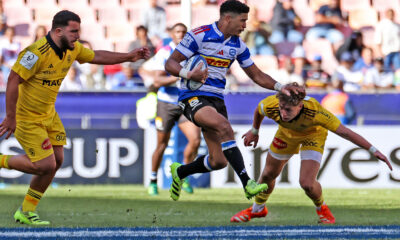
 KEO News Wire2 days ago
KEO News Wire2 days agoStormers lead the SA charge in Investec Champions Cup play-off race
-
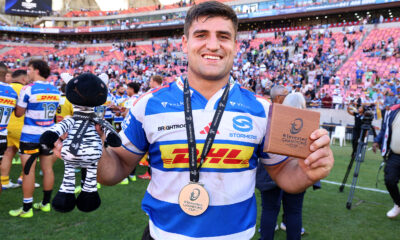
 KEO News Wire5 days ago
KEO News Wire5 days agoSA’s Super Saturday as Stormers & Sharks win big
-
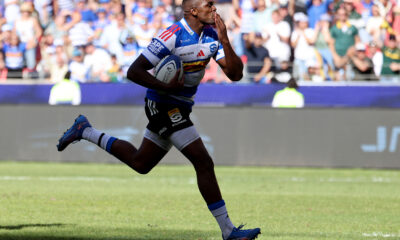
 KEO News Wire2 days ago
KEO News Wire2 days agoDylan Maart nominated for Investec Champions Cup Try of the Round
-

 KEO News Wire4 days ago
KEO News Wire4 days agoIn-form Springboks trio star in the Investec Champions Cup
-
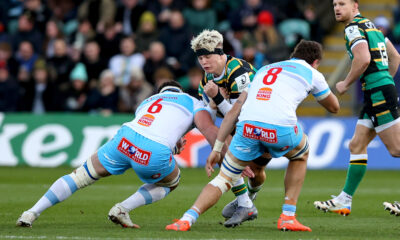
 KEO News Wire4 days ago
KEO News Wire4 days agoElrigh Louw brings light to another dark day for belittled Bulls
-

 KEO News Wire4 days ago
KEO News Wire4 days agoStormers and Sharks deliver as Bulls take heavy hit in Investec Champions Cup Round 2
-
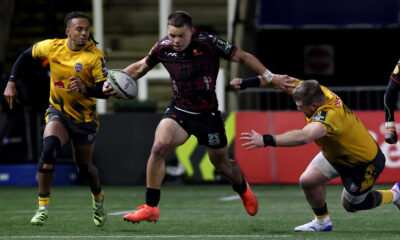
 KEO News Wire4 days ago
KEO News Wire4 days agoCheetahs, Lions fall short as EPCR Challenge Cup brings late drama
-
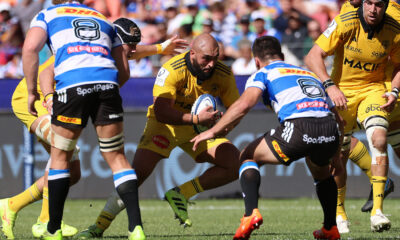
 KEO News Wire2 days ago
KEO News Wire2 days agoDe Villiers among the elite in Investec Champions Cup

